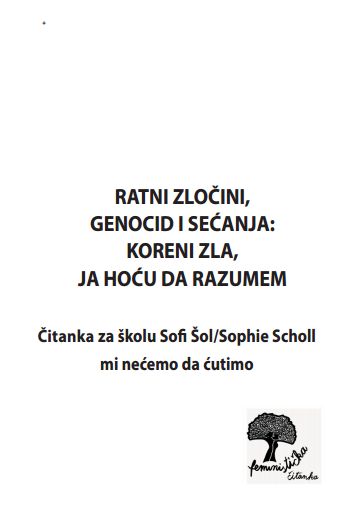
We kindly inform you that, as long as the subject affiliation of our 300.000+ articles is in progress, you might get unsufficient or no results on your third level or second level search. In this case, please broaden your search criteria.

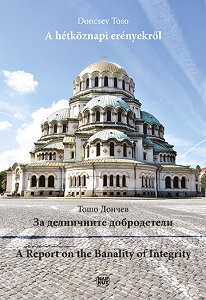
“Rescuing Jews” in Bulgaria refers to the fact that during World War II in a Bulgaria allied with Nazi Germany there were two occasions when the nearly 50,000 Bulgarian-citizen Jews averted deportation at the last minute ina near-miraculous way. Th e outcome was that Bulgaria became the only European country whose Jewish population was larger at the end of the war than at the beginning. But I need to underscore that the story is limited exclusively to Jews who were Bulgarian citizens, because the other part of this history is of Macedonia, and Trakya (Thrace), in the Aegean Sea. These regions were turned over to Bulgaria administratively but not annexed,and with the aid of the Bulgarian authorities the nearly 12,000 Jews who lacked Bulgarian citizenship were deported in 1943. Since this occurred in an early stage of the Holocaust,hardly anyone survived. Th e Bulgarian historians and the country’s official policy deserve kudos in accepting responsibility for the events in the territories they were occupying militarily, and today, in 2015 they are increasingly sincere in facing up to their actions. Indirectly, this makes the actions of the heroes in “Old Bulgaria,” in other words, present-day Bulgaria, which rescued the Jews, even more praiseworthy.
More...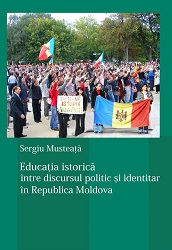
The work is the result of the project Geschichtslehrbücher zwischen politischer Propaganda, nationalistischen Konstruktionen und Wissenschaft. Untersuchungen zur Entwicklung des Schulfaches Geschichte in den posttotalitären Staaten Südosteuropas am Beispiel der Republik Moldau, der Ukraine und Rumänien started in 2005 and completed in 2008, implemented in partnership with „Georg Eckert” Institute for International Analysis of Textbooks and due to the financial support of „Gerda Henkel” Foundation, Germany.The work comprises the following parts: introduction, the role of history in society development, teaching history in the Republic of Moldova – between ideology and propaganda, conclusions and recommendations, sources and bibliography, summary in English and index of names, the main text being enriched with tables, annexes, and pictures.In Chapter I, The Role of History in Society Development, the author approaches several aspects regarding history as science, the relations between history and politics, the right of every citizen for access to authentic history, relations between history education and national identity, the role and importance of history in the system of education, the place of history curriculum in the national system of education and the importance of the school textbook in achievement of the educational objectives.In Chapter II, History Teaching in the Republic of Moldova: Between ideology and political propaganda, the following issues are discussed: the policy of the Communist Party in the Soviet times – pollution of history science, from the national idea to the national curriculum (1988/89-2001), development and publishing of the school history textbooks (1991-2009), history between reform and counter-reform (2001-2009) and history teaching in Transnistria separatist region.The author comes with the list of conclusions and recommendations. In the Republic of Moldova there is no unity and continuity in history teaching. Frequent interventions in history teaching have not allowed forming qualitative history education in citizens. For reconciliation in history teaching and historical content in the Republic of Moldova, some specific steps are to be taken in the following fields: politics, finance, and administration; publishing, curriculum design, and textbook development, as well as printing and dissemination of textbooks. Thus, the author recommends the Government of the Republic of Moldova: to carry out a series of actions through which they will ensure that education is a national priority; to provide a legal and legislative background for qualitative education; to develop mechanisms of public debates on educational policies; to bring contribution to the development of national publishing industry based on the principles of competition; to support research referring to textbook development and assessment; to promote and facilitate exchange of information regarding research in the field of curriculum and educational materials; to develop partnerships among governmental and non-governmental institutions expressed in partnership agreements, as well as agreements between two or more parties in the field of educational policies; to establish forms of regional cooperation in the field of history teaching in order to educate young generations for better understanding between neighbors; to promote mutual understanding among nations that would help understand everybody and fight prejudice and mutual outcast; to facilitate and encourage contacts among professional associations of historians and teachers at both the national and international level in order to allow exchange of experience, ideas, and suggestions on curricula, textbooks, teaching methods, and research in history.
More...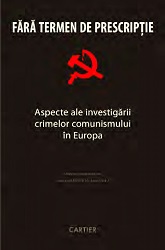
The book on Communist regimes in Eastern European countries
More...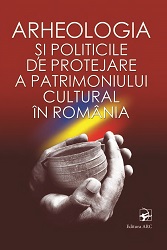
The book is a collection of papers on archaeological heritage preservation and management in Romania
More...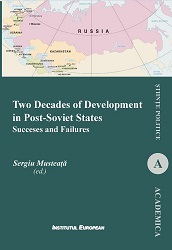
The book includes various chapters on post-soviet developments
More...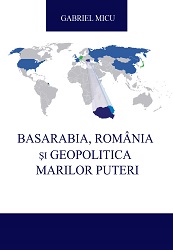
The book on Bessarabian problem, Romania and Geopolitics of the Great Powers
More...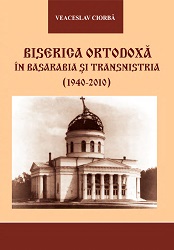
The on history of Church of Bessarabia and Transnistria (1940-2011)
More...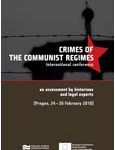
The conference was hosted by Jiří Liška, Vice-chairman of the Senate, Parliament of the Czech Republic and the Office of the Government of the Czech Republic and organized by the Institute for the Study of Totalitarian Regimes together with partner institutions from the working group on the Platform of European Memory and Conscience
More...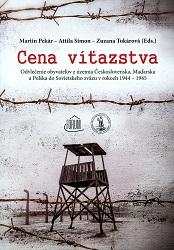
This publication, the subject of which is the Gulag phenomenon and the mass abduction of citizens from Central Europe to Soviet labour camps, mostly consists of written versions of conference papers. The conference entitled „The Price of Victory“. Abduction of Citizens from Slovakia and Neighbouring Countries to the USSR in 1944–1945 was held in Košice on 24 November 2016, and its organizers—the Forum Minority Research Institute and the History Department of the Pavol Jozef Šafárik University in Košice—invited experts on the theme from four countries (Slovakia, Hungary, Poland and Ukraine).
More...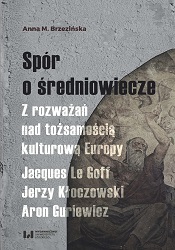
The book is a proposal of reading the works of the leading European medievalists of the twentieth century in the cultural context of medievalism, understood here as a belief in the fundamental role of the Middle Ages for the development of a specifically European system of values. An innovative idea was to use a comparative perspective for three historiographic traditions: Polish, French and Russian. Inscribing into the “bright legend” of the Middle Ages through perceiving such values as respecting differences with respect for local tradition, subsidiarity and solidarity towards the community, the three historians indicate the basic features of European unity, actively shaping the debate on the identity of contemporary Europe. // Książka jest propozycją odczytania dorobku czołowych europejskich mediewistów XX wieku w kulturowym kontekście mediewalizmu, rozumianego tu jako przekonanie o fundamentalnej roli średniowiecza dla wykształcenia swoiście europejskiego systemu wartości. Nowatorskim pomysłem było zastosowanie perspektywy porównawczej dla trzech tradycji historiograficznych: polskiej, francuskiej i rosyjskiej. Wpisując się w „jasną legendę” średniowiecza, poprzez dostrzeżenie w nim takich wartości, jak poszanowanie różnic przy jednoczesnym szacunku dla tradycji lokalnej, pomocniczość czy solidarność wobec społeczności, trzej historycy wskazują podstawowe cechy jedności europejskiej, aktywnie kształtując debatę nad tożsamością współczesnej Europy.
More...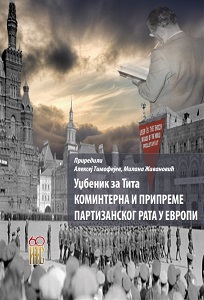
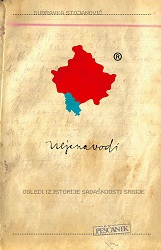
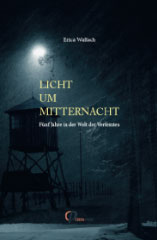
In this autobiographical book, Erica Wallach gives us a deep and personal insight into the experience of her five-year imprisonment. She was suspected of espionage and was sent to prisons in 1950 in the GDR and the Soviet Union as well as to the Workuta Soviet labor camp. Her husband, Robert R. Wallach, a soldier in the U.S. Army, and the their two children, waited in vain for her return to Paris, the Wallach family's place of residence at that time. They had no information about the reasons for her sudden disappearance and about Erica's whereabouts. The author describes the methods of totalitarian systems that are used to break prisoners in solitary confinement in order to obtain the desired confession from them. And she tells how she still managed to survive those years. This new, expanded edition has a German-English bilingual epilogue, written by Erica Wallach in the late 1970s and appearing here for the first time. <p> Erica Wallach gewährt uns in diesem autobiographischen Bericht einen tiefen und persönlichen Einblick in ihr Erleben jener fünf Jahre Inhaftierung, die Sie, der Spionage verdächtigt, ihrer Familie entrissen in Gefängnissen der DDR und der Sowjetunion sowie im sowjetischen Arbeitslager Workuta verbringen mußte, weil sie ihren Pflegeeltern Noel und Herta Field, die im damaligen Ostblock in Schwierigkeiten geraten waren, im August 1950 zur Hilfe eilen wollte und sich zu diesem Zweck nach Ost-Berlin begeben hatte. Ihr Ehemann, Robert R. Wallach, ein GI der U.S. Army, und die beiden gemeinsamen Kinder, warteten vergebens auf ihre Rückkehr nach Paris, dem Wohnort der Familie Wallach zu jener Zeit. Sie hatten keine Informationen über die Gründe des plötzlichen Verschwindens und erhielten keine Auskunft über den Aufenthaltsort von Erica Wallach. Die Autorin schildert jene Methoden totalitärer Systeme, mit deren Hilfe Gefangene in der Isolationshaft gebrochen werden, um von ihnen das gewünschte Geständnis zu erhalten. Und sie erzählt darüber wie es ihr trotzdem gelungen ist, jene Jahre zu überstehen. </p>
More...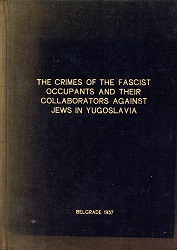
Published by Federation of Jewish Communities of the Federative People’s Republic of Yugoslavia, Belgrade 1957
More...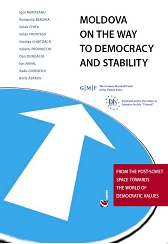
Since the disintegration of the USSR in 1991, Republic of Moldova has made clear progress towards the consolidation of its state, of its military and civil institutions, making itself notable on the geopolitical map of Europe. However, Moldova seems to be still scarcely present on the mental maps of the decision-makers from the West. Unlike the Baltic nations, that embedded themselves into the mind of the European public as a cohesive group of free nations, distinct from their poorer neighbors (Belarussians, Russians or Ukrainians, whit their more violent history after the disintegration of the Soviet Union), Moldova was approached with prudence if not completely neglected so that when important EU officials have remembered, after 2003, about the post-soviet origins of this republic, the Chisinau diplomacy felt offended. // The book provides a conceptual and analytic foundation for addressing the agenda of the security sector reform in Moldova. Given the tremendous tasks that have challenged Moldova in the last decade we all expect that the energy and commitment of its political, economic and cultural elites will be at least equivalent to it. By “anatomizing”, these crisis-prone issues have invited us to reflect upon their complex interdependence, as well as towards effective policies in Moldova.
More...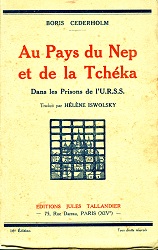
From 1924 to 1926, the Soviet government, or more precisely the Cheka, detained me, a foreigner, not guilty of any crime, in various places of detention, and finally deported me to the concentration camp. of Solovetzk for a period of three years, without prior judgment and in force by a simple decision of the Gué-Pé-Ou, in other words the Cheka. // My experiences in Soviet Russia are so implausible, because of the cruelty and cynicism shown towards me, that I have found it useful to add to this book the copy of certain documents extracted correspondence concerning my "case" and exchanged between the Consulate of Finland and the Public Commissariat of Foreign Affairs. Unfortunately, I am currently unable to publish in full the many documents relating to the talks between the Finnish government and the Soviet government regarding my arrest and release. But the few pieces that I have found opportune to publish amply confirm the veracity of my account. I would like to draw the reader's attention to the fact that in the course of the following account I have changed the surnames of the people I have mentioned, as well as certain circumstances, but only in cases where I do so. I deemed it necessary for the safety of these people, who are still alive and who are in a territory where they would risk being reached by the Gué-Pé-Ou, in other words the Tcheka. (from Author’s introduction) - DIGITIZED COPY OF THE 1928 EDITION OF «EDITIONS JULES TALLANDIER», Paris
More...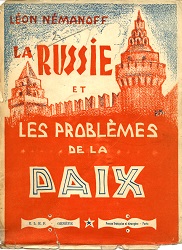
Napoleon said that a country’s foreign policy is determined by its geographical position and its permanent interests. German geopoliticians, led by Haushofer, did not contradict him. If, in our capacity as human geographer, we find the direct relation of the natural environment to politics too summary, by a method capable of sometimes misleading uncritical minds or even of justifying abominable acts, on the other hand, we are ready to follow Léon Némanoff in a similar demonstration, but which does not ignore the human factor and economic influences. // The author of “Russia and the Problems of Peace” is a specialist in Slavic issues, as we had noticed in the heyday of the S. d. N. His training meets scientific requirements. He even manages to remain objective, in dealing with his own country. This is not to say, however, that he will not let his patriotism pierce his words. And M. Némanoff will take us on an astonishing adventure, that of the Russian people. He will make us relive it as he feels it, intensely. Departing with him from the constants of Russian politics, we will watch a historical film which will now unfold logically, the characters of this poignant drama obeying in a way an irresistible imperative.
More...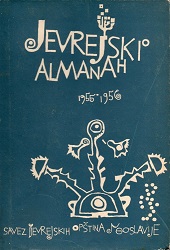
publishjed by »Savez Jevrejskih Opština Jugoslavije«, Belgrade 1956 // Dr Albert Vajs: Na kraju prve i na početku druge decenije / Dr Andrija Gams: Društvene borbe kod stvaranja stare jevrejske države Vuk Vinaver: Jevreji u Srbiji početkom XIX veka./ Dr Lavoslav Glesinger: Jevreji i Hrvati u Arapskoj Spaniji / Dr Zdenko Levntal: Jedan velikan duha: Maimonides / Dr Samuel Pinto: Prosvjetne prilike bosanskih Jevreja za turske vladavine / Prof. Miroslava Despot: Zagrebački knjižar Lavoslav Hartman / Ladislav Fišer: Jevrejstvo Bačke / Jakir Eventov: Omladina iz 1918 godine / Jakov Atijas: „Esperansa“ — Jevrejski sefardski studentski klub u Zagrebu ./ Aron Alkalaj: Dvanaest godina Jevrejske čitaonice u Beogradu 1929—1941 / Mirko Sekelj: Učešće subotičke. jevrejske omladine u borbi protiv okupatora ./ Avram R. Mevorah: O radu Saveza jevrejskih opština prvih dana po oslobođenju Beograda / Aleksandar Levi: Dva potresna muzeja / Vera Stein-Ehrlich: čudo regeneracije / Bata Gedalja: Dr Fridrih Pops / Aron Alkalaj: Sećanja na Isaka Mašijaha / Sofija Almuli: Jelena Demajo / Maja Bošković: Magda Bošković / Edita Vajs: O jevrejskim dečjim zabavištima / Aleksandar-Dov Stajner: Logorovanje naše omladine / Dr Arje Levavi: Izrael danas / Cvi Loker: Razni aspekti jugoslovensko-izraelskih odnosa / David A. Alkalaj: Jugoslovenska alija / Dr Jakov H. Kalderon: O izraelskoj štampi / Dr Pavle Neuberger: Jugoslovenski Jevreji u SAD / Dr Solomon Gaon: Svetska sefardska federacija i njen kongres u Jerusalimu 1954 / Marko Marković: Pripovjedački lik Isaka Samokovlije / Bogdan Ciplić: Sećanje na Nenada Mitrova / Isak Samokovlija: Sarajevska megila / Ivo Andrić: Na jevrejskom groblju u Sarajevu / Hinko Gottlieb: Legenda o zimskom kaputu / Pavao Wertheim: „Baharaški rabin44 H. Heinea / Heinrich Heine: Djevojčica momku bje mila. — Gdje? / Heinrich Heine: Sleski tkalci / Zaječi, naša tugo / Liza i Oto Bihalji-Merin: Ulica mrtvih Jevreja / Gustav Krklec: Jevrejka s Bjelava / Desanka Maksimović: Suma u Izraelu / Ervin Sinko: Nisam se rodio da budem ganef! (Odlomak iz knjige: „Roman jednog romana" / Zak Konfino: Tiju Menahem razmatra slučaj Kraljevića Marka / Božidar Kovačević: Dete / Jožef Debreceni: Neverovatno leto / Magda Bošković: Mi Građanska djeca / Ljubiša Jocić: U varšavskom getu / Andreja Deak: Jevrejska legenda / Istvan Braun-Kvazimodo: I uspomene imaju svoju sudbinu / Dr Zeljko Lador-Lederer: Priča o tome kako se pet knjiga našlo na okupu 339 Ivan Ivanji: Pitanje Josipa Flavija / Đula Lukač: „Polizeistunde" / Maja Zrnič: Hijene./ Julija Najman: Riki se vratila / Eva TiČak-Vajler: Susret na Jadranu / Sonja Nahman-Premeru: Starost / Josef Finci: Liječnik / Rikica Ovadija: Dobar dan, ja sam Bunks / Vlada Rotbart: Ponovno viđenje / Vesna Demajo: Prsten / Zoran Gavrilović: Džon Hersej: „Zid" / Dr Teodor Kovač: Testament (Stevan Kvazimodo: Testamentum, roman) / Hronologija važnijih događaja iz života jevrejske zajednice u Jugoslaviji (1954 i 1955) / Bibliographia judaica jugoslavica 1945—1955 / Beleške o saradnicima i radovima.
More...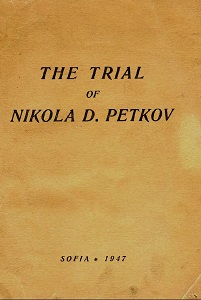
published in 1947 by the Bulgarian Ministry of Information and Arts / Press Department
More...